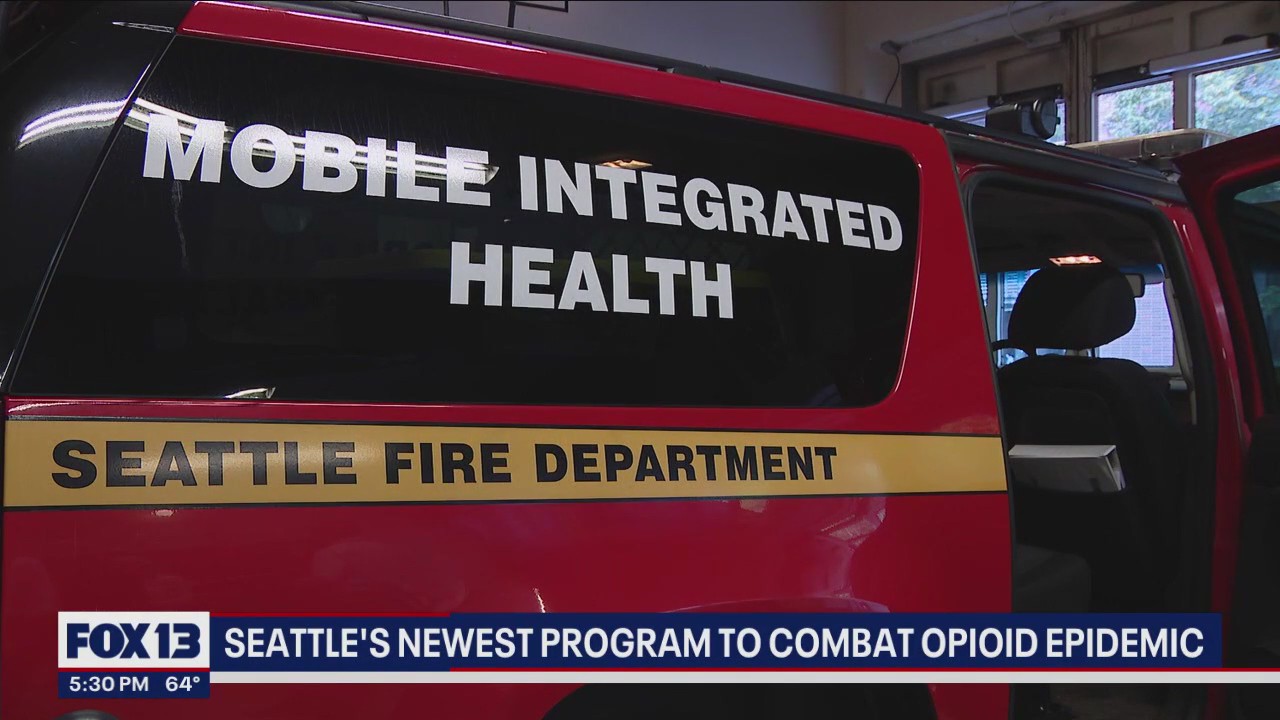Pilot program underway to stem opioid overdoses in Seattle

Pilot program underway to stem opioid overdoses in Seattle
The picture of Seattle’s opioid epidemic became a little clearer on Tuesday morning, as city leaders gathered at the Seattle Fire Department headquarters.
SEATTLE - The picture of Seattle’s opioid epidemic became a little clearer on Tuesday morning, as city leaders gathered at the Seattle Fire Department headquarters.
There, while unveiling a progress report on a pilot program to combat overdoses, Fire Chief Harold Scoggins explained how his crews are responding to 103 overdose calls per week on average. In fact, they’ve surpassed 4,000 calls this year. That’s more than all of 2022, with more than three months left on the calendar.
"Overdoses are happening around the city, all around the clock," said Chief Scoggins.
One solution, part of what Mayor Harrell called a continuum of strategies, involves the Health 99 team—a pilot program that started in July as an overdose response unit.
Early numbers show that the team is averaging three to five overdose calls a day. The goal is to offer followup outreach services to people, with hopes of engaging those individuals in services that can start them toward a path of recovery.
Two roadblocks that have become clear in the early weeks of the program: many overdose survivors don’t have permanent addresses, and there are limited spaces for treatment.
"It’s a complex issue," said Riley De Hoog, a case manager that works alongside Seattle Fire EMTs as part of Health 99. "Some of the things we’re seeing, we don’t have enough resources and services to offer these people right now."
Councilmember Lisa Herbold said it’s especially hard when people survive an overdose with nowhere to go.
"One of the things I hear most from the fire department is when they successfully reverse an overdose of someone who is living unsheltered, they save the lives and move on, they leave that individual on the street," said Herbold.
Currently, the Health 99 team operates Monday through Thursday, 9 a.m.–7 p.m. Those hours, according to Chief Scoggins, has less to do with the staff availability as it does the time when services are available to overdose victims.
Next week, the city will discuss spending $7 million to fund part of Mayor Harrell’s executive order from April, where he called for an overdose recovery center so that people can treatment, get stabilized and have access to resources.
All of this comes as the City Council on Tuesday approved a new ordinance to prosecute public drug use. Mayor Harrell has been calling on city leaders to pass legislation, which failed to get votes a few months ago. A second version of the legislation, which includes diversion language that the state law doesn’t have, passed 6–3 during the council meeting Tuesday evening.
READ MORE: Seattle City Council approves new ordinance to prosecute public drug use
Mayor Harrell has called it a "continuum of a response," noting that he wants treatment options, drug-use legislation, data collection on the drug epidemic, not to mention a variety of pilot programs aimed at the opioid epidemic.
In addition to Health 99, there is also a dual-dispatch program that is meant to determine whether a police, fire, or civilian response is necessary for various calls.
Harrell has also teased an executive order that should be coming out in the coming days that, among other things, would help collect data on the opioid epidemic.
"I believe I need to know as mayor—how many people are using drugs, how many people are affected by it, how many people are, right now as we speak, drug-affected," said Harrell. "We don’t have to go far to see the effects of what’s happening out there. It’s killing people who are using [drugs] and creating unsafe and unwelcoming conditions for all Seattle residents."
As for those on the frontlines, De Hoog told FOX 13 that she can’t control the systems in place. Though, she’s hopeful the program she’s a part of will help city leaders better understand the roadblocks they’re facing, allowing them to fine-tune the care that’s needed for people battling addiction.
"It’s important to me," said De Hoog. "That’s why I keep doing it. These folks are suffering, and that’s the line of work I’m in. I’m trying to make a difference to those folks that are suffering."
You can read more about Mayor Harrell’s plan to improve addition treatment, and proposed drug-use legislation on the City of Seattle website.

